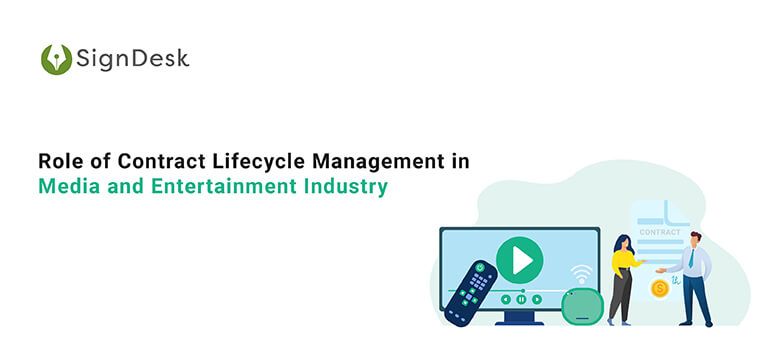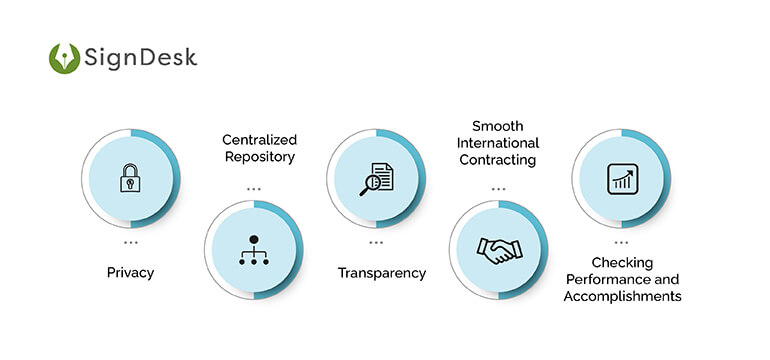
Contracting In Media & Entertainment
The media and entertainment industry keeps everyone glued to their favorite entertainment channels and online streaming services, from blockbuster movies and daily TV shows to music hits. The creation of entertainment undergoes a whole lot of effort, and the process can’t begin until contracts are approved, negotiated, and signed. Contract management software became essential for the smooth functioning required to complete quality productions.
According to reports, the funding obtained by India’s media and entertainment industry rebounded in 2020 after a decrease the previous year, grossing about 878 million USD. In 2020, the industry raised a total of $85 million through 85 fundraising deals. This was the sector’s biggest revenue since the financial year 2018.
However, the media and entertainment industry’s economy is very volatile and uncertain. Entertainment companies frequently reform, and merge, resulting in plenty of changes and transitions. Consumer tastes are also famously fickle, and evolving trends in entertainment could positively or negatively affect creative artists and media companies.
To address such challenges and protect the commercial interests of all parties, the industry relies heavily on contracts and entertainment industry software for which a seamless contract administration software is also necessary.
The industry deals with a wide range of contracts and, as a result, faces some common challenges in managing them. Good software for contract lifecycle management can improve the scenario.
Types of Contracts in the Media and Entertainment
When it comes to entertainment industry contracts, the various types of contracts utilized are as follows:
-
Copyright Agreements:
These agreements allow for the use and distribution of creative property, such as an image or a song, by conveying the license to possess the same. This allows the organization under which the artists are working to use the artist’s creation as an asset for them in exchange for a sum of money.
-
Intellectual Property:
Intellectual property comprises intangible intellectual works and comes in various forms. Some of its broad types are copyrights, patents, trademarks, and trade secrets. Entertainment companies compete for greater control over ‘intellectual property’ for which they require a lucrative contract for their desired artists.
-
Optional Contracts:
Artists must be protected from contracts that are improperly written. They often sign an option agreement that does not include an exit clause, allowing them to back out if the company refuses or fails to produce their content despite reserving them to work exclusively with that company.
-
Personal Service Agreements:
In the entertainment industry, this is one of the generic contracts that binds artists to work with a firm for a set amount of time to create content. These contracts deal with conflict of interests where the artist is not allowed to work in other organizations until the term of the contract expires.
-
Technological Contracts:
Media and entertainment and technology are synonymous with each other. To excel, one needs to deal with technology for which contracts are necessary. Each one of the technology deals has its own set of T&Cs, cycles of payments, and so on.
-
Freelance Contracts:
Media companies frequently work with independent content creators on a freelance basis. Typically, they are employed for a single or a few tasks, and then they are relieved after the task gets over. The contracts may be renewed in some instances if both parties agree. As a result, freelance agreements are common in this industry.
Challenges in Media and Entertainment Contracts
The Media and Entertainment sector works with a wide variety of contracts in large quantities. As a result, keeping track of hundreds of contracts at the same time becomes difficult. The industry’s evolving needs result in numerous other challenges, which include:
-
Key Performance Indicators (KPIs) –
KPIs are essential for media firms as they clearly illustrate how effective a firm has been in achieving its goals. However, because contracting typically encompasses a wide range of activities, contract managers may find it difficult to draw a direct link between these actions and their eventual effects, whether favorable or poor.
-
Incompetent Methods for Storage –
Contracts are often kept in a certain set of folders or flash drives, which becomes difficult for the users to locate them quickly in the hour of need. Furthermore, this strategy offers a lot of room for agreements to be broken.
-
Global Compliance –
Media organizations, especially news agencies and those involved in the film industry, frequently transmit contracts across borders. As a result, ensuring that their contracts are compliant with international law becomes a daunting task.
-
Sackings and Renewals –
Companies lack insight into deadlines, reminders, contract expiration and renewal dates, and any other terms that must be closely managed to ensure maximum contract compliance due to the lack of a competent CLM system. As a result of the lack of visibility, compliance may suffer.
-
Maintaining Confidentiality –
There is no doubt that contracts are private documents that should not be shared with just anybody. With all of the other important jobs on your plate, regular contract surveillance to prevent unauthorized access is not just an extra hassle, but also practically unattainable.
How Can Advanced CLM Solutions Help?
Despite the fact that the media & entertainment industry is contract-heavy, the issues listed above show that many organizations in the area lack the necessary technology to handle their contracts effectively. Media companies may suffer both tangible and intangible damages as a result of this. This can be avoided by using a sophisticated CLM solution.
An efficient CLM tool helps in overcoming the challenges, in the following ways:

-
Privacy:
The worth of an entertainment corporation is based on the artists it employs and their respective works. As a result, it is critical for businesses to retain confidentiality and regulate access to the contracts they have with these artists. No business wants their contracts to end up somewhere they shouldn’t.
A good CLM system with permission-based user roles restricts who can view contracts and controls the level of access given to users, ensuring that only the intended audience has access to the entertainment contract agreement.
-
Centralized Repository:
As previously said, media and entertainment organizations use the traditional technique of keeping papers, which is to save them in folders or on flash drives. This makes it difficult to find them and increases the likelihood of their being lost. This difficulty is solved by aggregating contracts into a single centralized contract repository, which is provided by modern CLM software.
-
Transparency:
Contracts in the media and entertainment business are innumerable. It is quite tough to keep record of each and every contract’s status and important dates. A company can lose a lot of money if they miss even a single deadline.
-
Smooth International Contracting:
Contracts with a wide range of duties and milestones are dealt with in this industry. Appropriate milestones and metrics can be pre-programmed with smart CLM software for precise tracking and assessment of contract performance, enabling visibility and alerting parties in the event of any deviation or delay in the milestones defined. This protects businesses from operational risks and ensures optimum compliance.
-
Checking Performance and Accomplishments:
Contracts with a wide range of duties and achievements are dealt with in this industry. Appropriate parameters for achieving goals can be pre-programmed with smart CLM software by enabling visibility and alerting parties in the event of any delay.
Automate and Expedite Service Contracts With SignDesk CLM
SignDesk‘s end-to-end contract management tools – CONTR.ACT – enables business teams to draft contracts and negotiate provisions in real-time.
CONTR.ACT also offers simple eSignature and eStamping integrations for quickly and securely finalizing contracts, as well as AI-powered contract analytics to help executives make better decisions.
Businesses can manage all company contracts online and enable a fluid workflow process with SignDesk’s smart CLM solution, reducing TAT by more than 50%.
Schedule a free demo now to learn more about contract management software for the media and entertainment industry.
Get a free trial now!